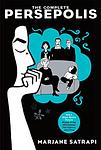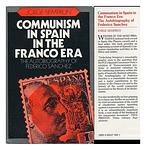The Greatest Iranian, Spanish "Nonfiction" Books Since 1980
Click to learn how this list is calculated.
This list represents a comprehensive and trusted collection of the greatest books. Developed through a specialized algorithm, it brings together 300 'best of' book lists to form a definitive guide to the world's most acclaimed books. For those interested in how these books are chosen, additional details can be found on the rankings page.
Genres
Countries
Date Range
Reading Statistics
Click the button below to see how many of these books you've read!
Download
If you're interested in downloading this list as a CSV file for use in a spreadsheet application, you can easily do so by clicking the button below. Please note that to ensure a manageable file size and faster download, the CSV will include details for only the first 500 books.
Download-
1. Persepolis by Marjane Satrapi
This graphic novel is a memoir that provides a personal account of the author's childhood and young adult years in Iran during and after the Islamic revolution. The story portrays the impact of war, political upheaval, and religious extremism on ordinary people, while also exploring themes of identity, resilience, and the power of storytelling. Despite the harsh realities the protagonist faces, the narrative also includes moments of humor and warmth, providing a nuanced view of life in Iran during this tumultuous period.
-
2. Persepolis Two by Marjane Satrapi
This graphic novel continues the story of a young girl growing up in Iran during the Islamic Revolution. After being sent to Europe for her safety, she struggles with feeling out of place and longs for her homeland. Eventually, she returns to Iran, only to find it vastly different from the place she remembered. The book explores themes of identity, culture, and the effects of political upheaval on a personal level.
-
3. Reading Lolita in Tehran by Azar Nafisi
The book is a memoir that takes place in Iran from 1979 to 1997, during the Islamic Revolution and the Iran-Iraq War. The story focuses on a professor who secretly gathers seven of her most committed female students to read forbidden Western literature in her home. As they read and discuss works by authors such as F. Scott Fitzgerald, Jane Austen, and Vladimir Nabokov, they explore their personal dreams and the losses they suffered due to the political, social, and cultural climate of the time.
-
4. Daughter Of Persia: A Woman's Journey From Her Father's Harem Through The Islamic Revolution by Sattareh Farman-Farmaian
This memoir recounts the extraordinary life of a woman born into a privileged family in early 20th-century Iran, who witnessed the dramatic shifts of her country's social and political landscape. Growing up in a polygamous household, she broke with tradition to pursue an education abroad, later returning to Iran to become a pioneering advocate for social reform and women's rights. Her story spans the rise and fall of the Pahlavi dynasty, the advent of the Islamic Revolution, and her subsequent exile, offering a personal lens on Iran's complex history and the role of women within it. Through her journey, she embodies the struggles and resilience of a nation in the face of modernity and change.
-
5. Funny in Farsi by Firoozeh Dumas
This memoir tells the story of an Iranian family who migrated to America in the 1970s, offering a humorous take on their experiences. The narrative focuses on the author's childhood and adolescence, exploring themes of cultural identity, assimilation, and the immigrant experience in America. It highlights the family's journey of navigating a new country and culture, while still holding on to their Iranian roots. The book showcases the author's ability to find humor in the most challenging situations, making it a heartwarming and amusing read.
-
6. My Last Sigh by Luis Buñuel
"My Last Sigh" is an autobiography that offers a candid and vivid account of the life and career of one of cinema's most groundbreaking and influential directors. The book delves into his early years in Spain, his deep friendships with prominent artists and intellectuals, and his experiences in the surrealist movement. It also explores his creative process, the making of his major films, and his philosophical and personal reflections. Rich with anecdotes and insights, the memoir provides a unique window into the artistic, social, and political climates of his times, revealing the complex and often contradictory nature of a fiercely original filmmaker.
-
7. Space In Motion by Juan Goytisolo
"Space in Motion" is a reflective exploration of the concept of space as it relates to human experience, culture, and history. The book delves into the ways in which space is perceived, constructed, and navigated, offering a philosophical and literary examination of the subject. The author weaves together a tapestry of ideas, drawing from various disciplines and perspectives, to challenge the reader's understanding of space beyond its physical dimensions, considering its impact on identity, memory, and our place in the world. Through a blend of narrative and critical thought, the work invites contemplation on the fluidity and dynamism of space in our lives.
-
8. Communism In Spain In The Franco Era by Jorge Semprún
This book provides an in-depth analysis of the communist movement within Spain during the rule of Francisco Franco, a period marked by authoritarianism and political repression. It delves into the complexities and challenges faced by communists who operated underground, striving to resist and eventually overthrow Franco's regime. Through a blend of historical documentation and personal narratives, the work sheds light on the ideological struggles, internal conflicts, and the broader impact of communism in Spain's fight for democracy and social justice. The narrative not only explores the political landscape of the era but also examines the human aspect of resistance, highlighting the resilience and sacrifices of those who fought against tyranny.
-
9. The Nature Of Nature by Enric Sala
This book explores the intricate and essential relationship between humanity and the natural world. The author, a renowned marine ecologist, delves into how nature operates, emphasizing the importance of preserving biodiversity for the planet's health and our own survival. Through a combination of scientific insights and personal experiences, the narrative makes a compelling case for the urgent need to protect and restore the Earth's ecosystems. The author argues that by understanding and respecting the fundamental principles of nature, we can solve many of the environmental challenges facing us today, ultimately leading to a more sustainable and prosperous future for all living beings.
Reading Statistics
Click the button below to see how many of these books you've read!
Download
If you're interested in downloading this list as a CSV file for use in a spreadsheet application, you can easily do so by clicking the button below. Please note that to ensure a manageable file size and faster download, the CSV will include details for only the first 500 books.
Download







